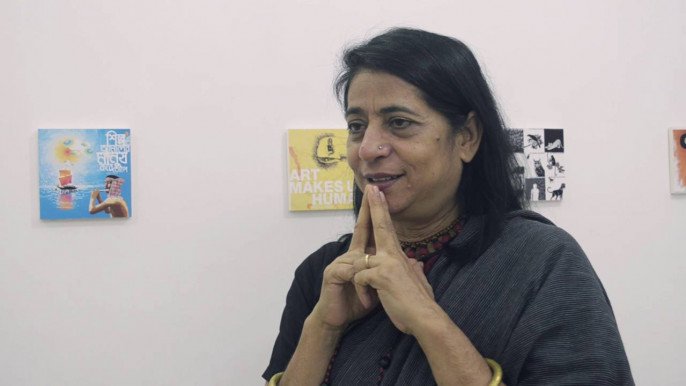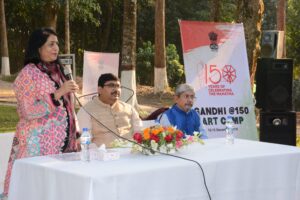Bangladeshi Artist Rokeya Sultana’s solo exhibition suspended in India

A solo art exhibition by Bangladeshi artist Rokeya Sultana in India has been indefinitely postponed over “safety and security” reasons in light of the Durga Puja communal violence against the country’s Hindu minority. Sultana is an award-winning printmaker and painter.
The exhibition has been cancelled for the time being over concerns that her work could be vandalised, official sources told .
Last week, the 63-year-old international award-winning Bangladeshi artist Rokaiya Sultana was all set for a solo art exhibition in India from October 23 to December 11. The exhibition, which was planned as a joint collaboration between the Indian Council for Cultural Relations and the Dhaka-based non-profit Bengal Foundation, was to showcase 120 to 130 pieces from the artist’s work.
A printmaker and painter, Sultana also serves as the Chair of the Faculty of Fine Arts at Dhaka University.
In light of the Durga Puja communal violence against the country’s Hindu minority in Bangladesh, however, the Indian government decided to postpone their exhibition indefinitely.
Although Sultana has performed in India before, the now-cancelled show was intended to showcase the full breadth of her work over forty years. The cancellation of the exhibition has come as a shock to his colleagues at Dhaka University as well as other prominent figures from the country’s art community.
Bangladeshi photographer Abir Abdullah, whose work has been published in publications such as the new York Times, der spiegel And Guardian, reacted saying: “It is definitely shocking to hear this. Artists from any country should not be restricted in showing their works or practicing freedom of expression. Why should they be blamed for the misdeeds of others?”

Meanwhile, Shishir Bhattacharjee, professor of fine arts at the University of Dhaka, had a more practical approach. “Rokeya, nicknamed ‘Lovely’ by some of us at university, is a talented artist. But sometimes, the consequences of political upheaval and foreign ties are beyond an artist’s control,” he told .
He pointed out that Bangladeshi artists have long faced sanctions in their own country. “I used to make political cartoons for newspapers, but I stopped after 2017, when comprehensive media laws were introduced in Bangladesh. Artists have been subject to repression due to laws like Section 57 of the Information and Communication Technology (ICT) Act.”
Many journalists, artists and activists have suffered the brunt of the ICT Act, including renowned photographer Shahidul Alam, whose to arrest For comments on student protests in 2019, global outrage erupted.
Sultana is known for playing with themes of femininity, sexuality and feminism. Her figure series ‘Madonna’ and ‘Relations’ are the most popular, as well as the print series ‘Fata Morgana’.
She has exhibited her work in countries such as Denmark, Egypt, Turkey, Taiwan, Nepal, Korea, France, Iran, Jordan and Pakistan at centers such as the Blacktown Arts Center in Australia and the Bengal Gallery of Fine Arts in Bangladesh.
Sultana has won numerous awards and scholarships, including the prestigious 2012 Fulbright Grant for a 9-month artist residency at the University of Nebraska-Lincoln. there she was learned Pressure printing technology used in the ‘Fata Morgana’ series.
Sultana’s works were launched on 7 October this year. exhibition at the Indian Cultural Centre, Gulshan, Dhaka. The event was supposed to be a curtain raiser for his first standalone show in India, which has now been cancelled.





